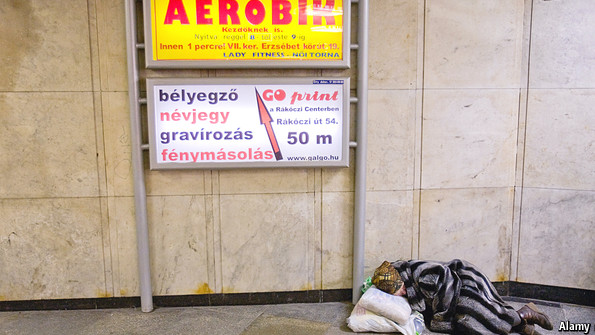
HUNGARY’S homelessness problem is nowhere more visible than in the historic heart of Budapest. Homeless people pull down their trousers and underwear in full view of startled tourists before relieving themselves on the pavement near parliament. Small piles of human excrement dot the back wall of the former headquarters of the state television, where the destitute huddle at night. Some even try to clean themselves on central bus-stop shelters after defecating, leaving brown smears across advertising billboards.
In response, the city council has passed a regulation outlawing what it calls “habitual living” in public spaces, including underpasses, bridges, playgrounds, much of the city centre and Budapest’s world heritage sites: the banks of the river Danube and the historic Buda Castle area. Debrecen, a city in eastern Hungary, has followed suit and banned the homeless from the city centre and nearby Nagyerd forest. Offenders can be fined, forced to carry out community service and even imprisoned.
These local rulings follow on the heels of a national law that allows local authorities to take such measures to protect “public order, security, health and cultural values”. The first version of the national legislation was ruled illegal by the constitutional court because it gave too much leeway to local authorities. Parliament voted in September to amend the law. Yet the new version has been condemned by homeless organisations. Even the United Nations has weighed in, with two special rapporteurs attacking the government for stigmatising the homeless, fuelling prejudice and abusing their human rights. The new law brings a criminal aspect to a social problem, says Luca Koltai, of Habitat for Humanity Hungary, a housing charity. “People can perceive the homeless not as poor and vulnerable people who lost their homes, but as criminals.”
more: theEconomist

 MMA countdown – Free Artists welcomes the resigned MMA-members!
MMA countdown – Free Artists welcomes the resigned MMA-members! TRANSZPARENCIÁT!
TRANSZPARENCIÁT!